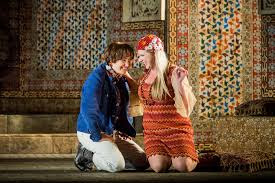The
starting nights Le nozze di Figaro was not so much an opera of two sections as
an opera of two groups. In the pit we had Sir Colin Davis and the Band of the Opera Home providing a crisply acerbe making
of Mozart’s score; onstage we had the Elegant Opera Refrain and a choice of
soloists, most of whom seemed set on a rather different – and, in the situation
of the chorus, absolutely lackluster – version of the ranking. Now on its
second rebirth, Bob McVicar’s all-the-hallmarks-of-a-classic manufacturing
should have the relaxed sway of a sophomore, but it was the first-night nerve fibers of an untried fresh which were shatteringly obvious at last evening's
performance.
When the layer increases on the overture it’s not upon the refined and mastered field of the Almaviva Château, but its off-duty behind the scenes afflication. A platoon of prancing footmen and scampering stage service personnel have taken over the home in their morning hours habit of washing and preparation; vitally it is their globe into which we get into, not that of their experts. The fun and horseplay is in itself harmless enough, but with further periods of trend forward in this modified 1830s establishing, the range of uniformed servants requires on a rather more scary subtext, crystallised in Figaro’s "Se vuol ballare".
Much has been said of McVicar's choice to move the establishing half a century later than the Beaumarchais unique - yet in exercise it's a soothing modification which does dual purpose, making outfits partially less restricting and reinvigoraing the rather exhausted Figaro trope of the category war.
Curiously, though, McVicar creates little attempt to interact with with the governmental consequences of this new establishing, and despite his indicated wish to "…guide the performers away from conventional funny toward a more genuine, agonizing studying of the text", it’s an aim that continues to be frustratingly unsatisfied. Tickets for many activities at Royal Opera House are only released in sets. Reservations of three or more seats may be assigned independently. If you have any concerns at all, please contact our sales staff on 020 7283 4040.
When the layer increases on the overture it’s not upon the refined and mastered field of the Almaviva Château, but its off-duty behind the scenes afflication. A platoon of prancing footmen and scampering stage service personnel have taken over the home in their morning hours habit of washing and preparation; vitally it is their globe into which we get into, not that of their experts. The fun and horseplay is in itself harmless enough, but with further periods of trend forward in this modified 1830s establishing, the range of uniformed servants requires on a rather more scary subtext, crystallised in Figaro’s "Se vuol ballare".
Much has been said of McVicar's choice to move the establishing half a century later than the Beaumarchais unique - yet in exercise it's a soothing modification which does dual purpose, making outfits partially less restricting and reinvigoraing the rather exhausted Figaro trope of the category war.
Curiously, though, McVicar creates little attempt to interact with with the governmental consequences of this new establishing, and despite his indicated wish to "…guide the performers away from conventional funny toward a more genuine, agonizing studying of the text", it’s an aim that continues to be frustratingly unsatisfied. Tickets for many activities at Royal Opera House are only released in sets. Reservations of three or more seats may be assigned independently. If you have any concerns at all, please contact our sales staff on 020 7283 4040.




No comments:
Post a Comment